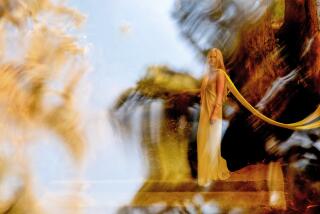Looking for Mr. Goodbook : OMENS OF MILLENNIUM: The Gnosis of Angels, Dreams, and Resurrection By Harold Bloom (Riverhead Books: 272 pps., $24.95)
- Share via
When a scholar who made himself famous as the guardian of the Western canon turns to the writing of his own spiritual autobiography, we ought not to be surprised to discover that it reveals far more about what he has read than what he has experienced.
Harold Bloom, America’s most commanding man of letters, is probably best known for his recent bestseller, “The Western Canon,” but he is also the author of nearly two dozen works that reveal a lifelong interest in sacred texts and visionary writing. Bloom’s latest book, “Omens of Millennium,” is his earnest effort to share something about his spiritual journey.
“Spiritual autobiography in our era, I thought until now, is best when it is implicit,” Bloom writes. “But the moment comes when you know pretty much what you are going to know, and when you realize that more living and reading and brooding will not greatly alter the self.”
Bloom is Jewish by birth, but he insists on calling himself a Gnostic and characterizing his book as “a Gnostic sermon.” Although Gnosticism is (and, even after reading Bloom’s book, remains) an obscure and impenetrable discipline, Bloom defines it simply enough as an ancient mystical tradition that seeks “direct acquaintance of God within the self.”
“Omens” is described by its author as “a personal religious testimony that reaches out to our common concerns as Millennium approaches.” So I expected Bloom to allow us to glimpse some of the more intimate experiences of a distinctly bookish public life. But he is apparently too courtly, too cerebral and perhaps too shy to engage in much baring of the soul. He refuses to “literalize” his spiritual experience, as he puts it, and so we are left with no real sense of whether or how he achieved a direct acquaintance of the Almighty.
The closest Bloom comes to a spiritual confession is a brief passage in which he describes a bout of depression that descended upon him in his mid-30s. “I got very wretched,” Bloom reports, and the melancholia that first presented itself as clinical depression turned into a spiritual rather than a psychological crisis. A chance encounter with a book on Gnosticism, he reveals, rescued him from the slough of despond and set him on the road toward enlightenment.
But we never find out if he got there because Bloom quickly retreats from revelation to the safer precincts of scholarship. Indeed, “Omens” abruptly turns from memoir to monograph, and Bloom devotes most of his book to a study of how the flavor-of-the-month themes of the so-called New Age--angels, visionary dreams, near-death experiences and anticipation of the millennium--are rooted in spiritual traditions that reach all the way back to the ancient world.
*
For example, Bloom offers a scholarly survey of angelology, starting in Babylon and Persia and then tracking forward through a couple of thousand years of religious tradition. When he reaches our own yearnful times, his patience runs out: Bloom declares that our “sentimentalization” of angels “debases” the solemn and even terrifying meanings that can be found in the arcane texts that he has studied.
“Contemporary accounts of angelic sights are unpersuasive,” he writes, “whether the personage sighted be a traditional angel or an alien transported by UFO.”
The whole point of Bloom’s book is that the offerings of the so-called New Age--”an endless saturnalia of ill-defined longings,” as he defines it--are shallow and silly when compared to what the ancients knew. So Bloom sets up the teachings of Gnosticism and other mystical traditions as “a spiritual standard of measurement” against which he weighs “New Age enthusiasms and wish fulfillments” and finds them sadly wanting.
“I would urge everyone concerned with angels, prophetic dreams, ‘near-death experiences’ and the oncoming Millennium to measure our current encounters with these phenomena against the best that has been known and written about them in the past,” writes Bloom in a single paragraph that sums up his book (and, I’d guess, his life’s work). “That is the purpose of this book: to raise up and illuminate these appearances in order to save them, by returning them to the interpretive wisdom of the Christian Gnostics, Muslim Sufis and Jewish Kabbalists.”
At its best moments, “Omens” is a good example of Bloom’s flair for reading familiar and sometimes fusty old books and showing us entirely new ways of understanding and appreciating them. It’s a feat he performed with real genius in “The Book of J,” a rereading of the Bible that I found not only eye-opening but soul-shaking and even life-changing, and something of the same gift is displayed in “Omens.”
Bloom, for example, draws a line from the biblical tale of Joseph--”the source of all Judaic dream interpretation”--to the pioneering psychoanalytic constructs of Freud, and he manages to run the line through Maimonides (“Dream is the unripe fruit of prophecy”), Shakespeare (“It’s past the size of dreaming: nature wants stuff / To vie strange forms with fancy”) and Nietzsche (“Real life has not the freedom of interpretation possessed by dream life”) before returning to his favorite sources.
“Ultimately, I prefer Valentinus the Gnostic, Ibn Arabi the Sufi, and Moses Cordovero the Kabbalist,” Bloom insists, “to Freud as an authority on the interpretation of dreams.”
“Omens” is informed by the same remarkable mastery of arts and letters that Bloom displayed with such assurance in “The Western Canon.” In fact, Bloom sometimes seems to be performing a kind of intellectual parlor trick or perhaps even a bit of self-parody in “Omens,” as when he manages to invoke, on a single breathtaking page of text, Freud, St. Augustine, Dante, Montaigne, Emerson, Moliere, Ibsen, Shakespeare, Proust, Joyce, Kafka, Beckett, Pirandello, Darwin, Francis Crick, Alexander Welsh and Sir Thomas Browne!
The coda of Bloom’s book is yet another endorsement of Gnosticism, a notably inner-directed approach to spirituality that he regards as the only way to avoid the “disasters of dogma, institutional corruption, historical malfeasance and cruelty” that he detects in more conventional religions. “Creativity and imagination, irrelevant and even dangerous to dogmatic religion, are essential to Gnosticism,” Bloom enthuses.
“What makes us free is the Gnosis,” goes a 2nd century text Bloom embraces as his credo--and, by the end of “Omens,” it is clear that intellectual freedom rather than spiritual enlightenment is what Bloom values and seeks. And we realize, too, that a man as refined and yet unfettered as Bloom could not have found his way to any expression of spirituality that is less elegant, less exalted or less demanding of true belief than the one he has chosen.
More to Read
Sign up for our Book Club newsletter
Get the latest news, events and more from the Los Angeles Times Book Club, and help us get L.A. reading and talking.
You may occasionally receive promotional content from the Los Angeles Times.








